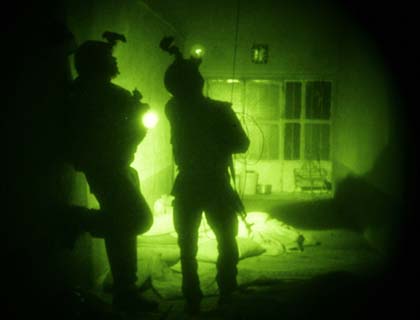KABUL - Foreign forces fighting in Afghanistan have become more accurate in night-time raids on homes, but they have stepped up the number and scope of the controversial operations so they affect more Afghan civilians, a report said on Monday. NATO-led troops improved the way they select targets, and say they now get their objective in four out of five mission, but also widened the pool of people they pursue, the report by the Open Society Foundations and The Liaison Office said.
Afghans with loose connections to insurgents appear to have become objectives -- including those who provide food and shelter, sometimes under duress -- rather than just active fighters or commanders within the insurgent groups.
There are also large-scale operations that target many homes or even whole villages, with dozens of men or boys detained for hours or even days. Although not all are designated night raids by the military, their timing means they are often seen as such.
The wider targeting and large-scale detentions may both be in violation of international law, the report warned.
"Although intelligence improvements have reduced the number of night raids that targeted civilians by mistake, the increased number and scope of night raids put many more civilians at risk than past intelligence flaws," the report said.
"Current patterns of detention suggest many night raids may be heavily (if not primarily) motivated by intelligence gathering," said the report, based on a year of research.
The report recognizes civilians can be questioned about insurgent activities, but warns that it should be done in a way that is within the law and protects them.
The NATO-led International Security Assistance Force said that it welcomed the report's findings and would study its recommendations to implement any that could improve operations, but defended them as an important military tool.
"Night operations are an effective method of maintaining the pressure on the enemy while minimizing risk to innocent civilians," said spokesman Jimmie Cummings, adding that they accounted for only 1 percent of civilian casualties caused by the coalition, and 85 percent ended without a shot being fired.
RISING NUMBERS, BETTER TARGETING
Night raids are one of the most hated foreign military tactics in Afghanistan and a source of friction between Western nations and President Hamid Karzai, who has said he wants them stopped altogether.
NATO-led troops ramped up the raids under General David Petraeus, who this summer stepped down as top U.S. and NATO commander in Afghanistan.
Between February 2009 and December 2010 night raids increased five-fold, according to publicly available statistics, the report said. In the three months from December 2010, there were an average of 19 a night.
One military source said in April 2011 that there might be as many as 40 taking place each night across the country.
NATO has tackled some of the main grievances about the raids, helped in part by extra intelligence-gathering equipment moved from Iraq and closer coordination with Afghan officials and the military, the report said.
Targets are chosen more accurately, there has been a reduction in property damage, more respectful treatment of women and more frequent co-operation with Afghan forces.
Afghan commanders in "coordination cells" at bases must sign off on all raids, Afghan forces are present in the vast majority of raids, and lead at least 25 percent -- although there are some complaints about theft and abuse by local troops.
But the report said that the number of raids, and confusion caused by darkness means they often pose a disproportionate risk to civilians. Afghan homes are often well-armed and robberies or violent assaults do not come only from the warring parties.
Foreign troops also appear to be too ready to pull the trigger, interpreting confused, frightened or simply innocent behavior, like running away from intruders or stepping outside, as "hostile intent."
"It was night when my two brothers, Ibrahim and Qand Agha, went out to bring some water," Humayoun from Khost province told a news conference to launch the report.
"There were some Americans standing (nearby) and when they saw my brother they opened fire. My brother Ibrahim died and they detained my other brother."
No reasons was given to the family and no compensation was given for the two members killed in the raid, he said.

